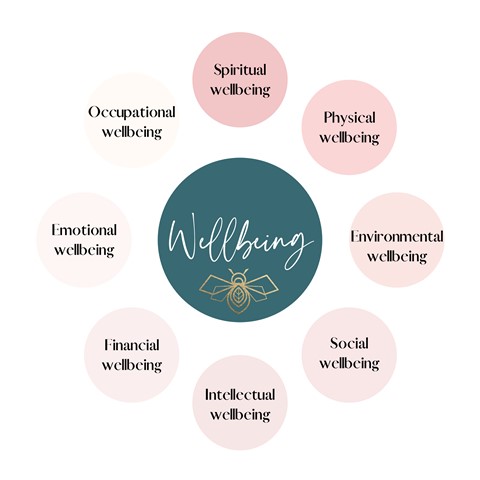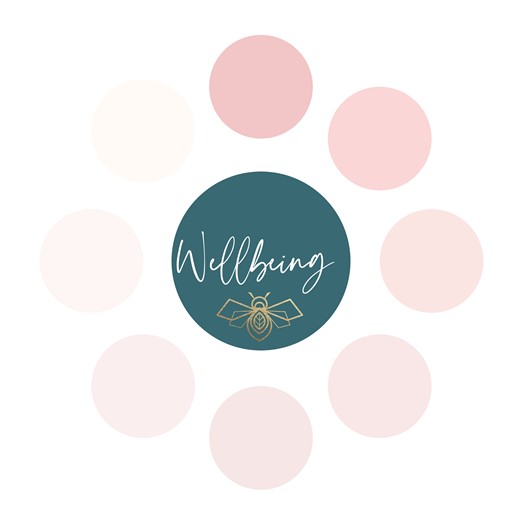Wellbeing and Ourselves

We live in a fast paced, often tumultuous society in which we are confronted with new problems and stressors on a near daily basis. Whether it be challenges we face at work, conflicts with family or friends, or much larger scale issues like the climate crisis, it is easy to become overwhelmed and feel helpless.
It can be difficult to comprehend the effects these challenges have on us and our feelings. They can cause us to feel stressed, anxious and unfulfilled in our relationships with ourselves, our loved ones and our surroundings. It is understandable that we are often left thinking “What I am missing? There must be something more.”
Wellbeing
The wellbeing model integrates multiple aspects of our lives, promoting a more holistic approach to leading a fulfilling life. As opposed to being a state of mind or a response to stimuli, wellbeing is a much broader concept of what it means to flourish, and what is necessary to allow us to do so.
Wellbeing has value in itself and asks not what can bring us nice feelings but rather what is good for people overall. There are many different aspects that make up wellbeing, and these may differ from person to person as what it means to live well is slightly different for all of us. For example, environmentally conscious people may place a significant importance on interacting with the natural world in order to live well. However, the main aspects of wellbeing are common across cultures and personal and spiritual belief systems.

We cannot reach our highest possible level of wellbeing unless each aspect of our wellbeing is attended to. All components of wellbeing are important and should be attended to, with the understanding that we can support our overall wellbeing with actions in the domains that we can control. For example, although we may be dealing with poor health or difficult social circumstances, we can still build wellbeing by considering all of the aspects that are within our control.
This makes it possible to live a meaningful and happy life even in difficult circumstances. The Holocost survivor Viktor Frankl wrote in Man’s Search for Meaning, “Everything can be taken from a man but one thing: the last of the human freedoms—to choose one’s attitude in any given set of circumstances, to choose one’s own way.”
The idea behind the wellbeing model is that by giving adequate attention to all wellness aspects that affect our overall wellbeing, we will be healthier mentally, physically and spiritually and be able to lead more fulfilling lives, contented lives, regardless of the circumstances and challenges that we face.

Spiritual wellbeing: Being in touch with your values and beliefs and finding meaning and purpose in everyday life.
Physical wellbeing : Taking care of your physical health, listening to your body and feeling in tune with its needs.
Environmental wellbeing: Feeling connected to your surroundings and interacting with the natural world in a sustainable way.
Social wellbeing: Creating meaningful relationships in which you feel supported and loved for who you are.
Intellectual wellbeing: Seeking to expand knowledge, create, and improve skills to live a simulating life.
Financial wellbeing: Feeling financially stable and in control of your own financial situation.
Emotional wellbeing: The ability to process and cope with life’s challenges in a productive and healthy way.
Occupational wellbeing: Feeling the work you do is meaningful and feeling valued and appreciated in your  .
Centers for Disease Control and Prevention, the CDC, recognizes wellbeing as a life outcome that is important to people and an important public health indicator. Higher levels of wellbeing are associated with decreased risk of injury and disease, improved immune system function and increased longevity.
A valuable feature of the wellbeing model is that it requires us to take a step back and assess our levels of satisfaction within the various aspects of our lives that contribute to our wellbeing. This introspection is necessary when it comes to finding fulfillment. It is important that we understand what is really meaningful to us in each aspect of our lives. Although the wellbeing model is one that everyone can apply to their lives, wellbeing in itself is a highly personal quest. Fill in the blank diagram below as you think about what your personal wellbeing priorities are.

Stay connected with news and updates!
Join my mailing list to receive the latest news and updates. Your information will not be shared.

